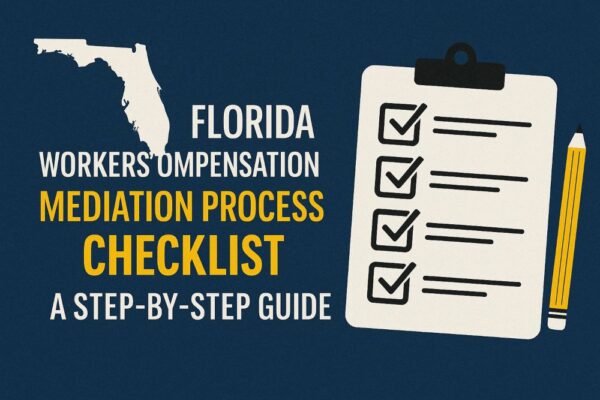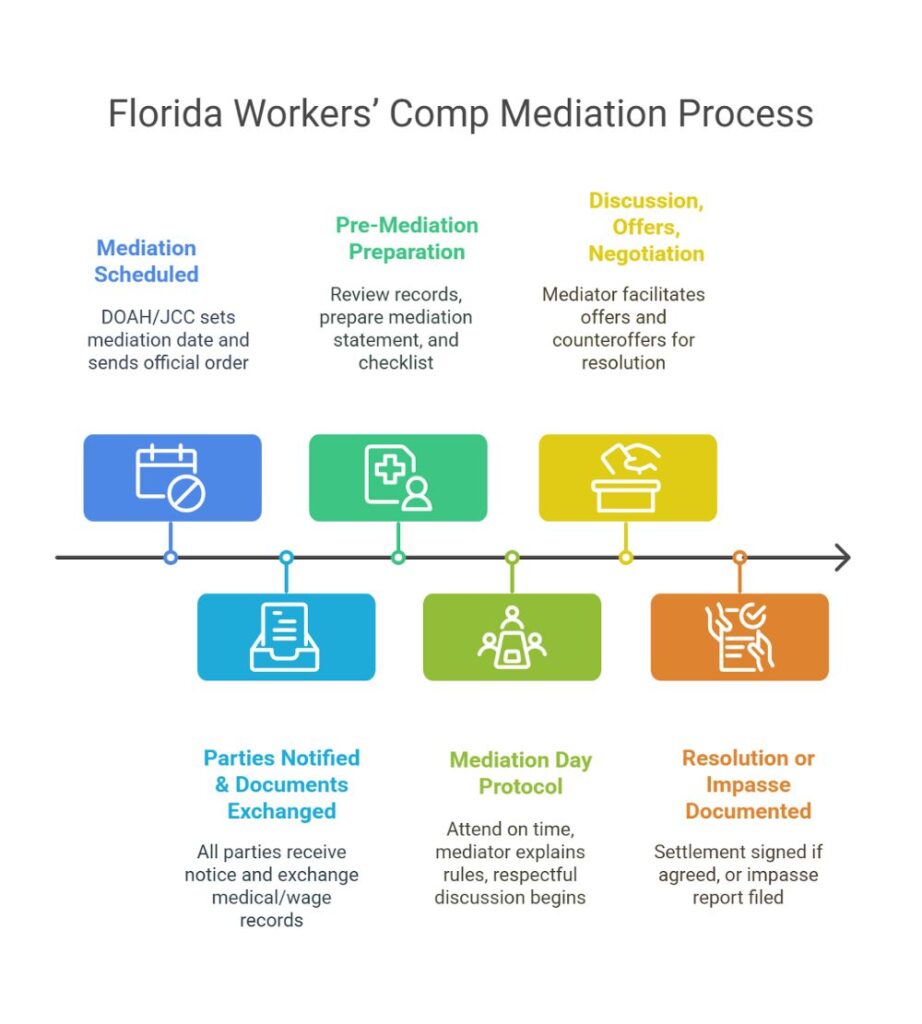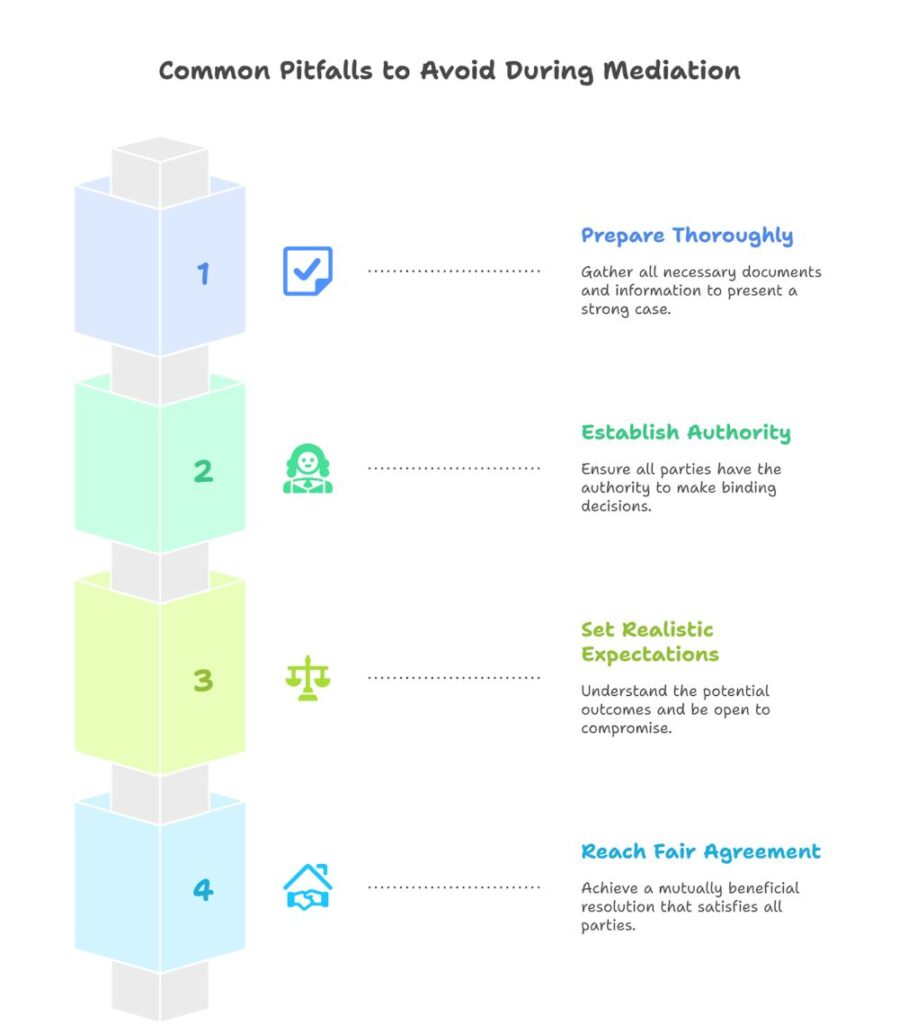

Navigating a workers’ compensation claim in Florida can feel overwhelming, especially when mediation is involved.
A step-by-step checklist helps injured workers, employers, and attorneys feel more prepared and confident.
Knowing what’s coming—and how to get ready—saves time, cuts down on stress, and honestly gives everyone a better shot at a fair outcome.
Mediation in Florida workers’ comp cases involves both sides meeting with a neutral mediator to resolve their issues. Using a detailed mediation checklist and understanding the steps helps parties prepare, dodge common mistakes, and know what happens after mediation wraps up.
Table of Contents
Key Takeaways
- Florida workers’ comp mediation follows a structured, required process.
- Preparation and checklists improve results for both workers and employers.
- Avoiding common pitfalls can help achieve a smoother, fairer outcome.
What Is Workers’ Comp Mediation in Florida?

Workers’ comp mediation in Florida is a structured meeting where both sides sit with an impartial mediator and try to reach an agreement. It’s definitely not the same as a trial or hearing—the mediator isn’t a judge and can’t force anyone to settle.
The mediator guides the conversation and helps everyone focus on what matters most.
The goal?
Get both sides to a fair agreement about benefits, unpaid medical bills, or whatever’s in dispute.
This process stays confidential, so what’s said in the room usually stays there. After filing a petition, mediation is generally mandatory in Florida workers’ compensation claims.
Mediation can save a ton of time and money compared to a court battle.
When Mediation Is Scheduled
Mediation usually happens soon after an employee files a formal Petition for Benefits. Once the petition goes to the Office of Judges of Compensation Claims, the judge sends out a notice and sets a mediation date.
By law, this is generally within 40 days of filing unless both parties agree to something else.
The scheduling keeps the claim moving and avoids endless waiting. Most cases can’t skip or delay mediation unless there’s a really good reason.
Who Attends the Mediation?
The main participants in a Florida workers’ comp mediation are the injured worker, the employer or their insurance company, and a certified mediator.
Lawyers for both sides are usually present to help explain the process and protect their clients’ rights.
Sometimes, an employer sends a representative with the authority to make decisions or settlements.
The mediator is neutral, experienced, and typically certified to handle these claims. Only those directly involved can attend; outside witnesses aren’t usually part of the session.
Keeping it to just the key people helps the discussion stay focused and private. This setup also encourages open conversation and protects everyone’s privacy.
Looking to resolve your workers’ comp case quickly and fairly? The Mediation Group offers trusted workers’ compensation mediation services across Florida to help you settle faster.
If you’re ready to get started, call us now!
Florida Workers’ Comp Mediation: A Step-By-Step Checklist

Mediation is a must in many Florida workers’ compensation claims. Every part of the process follows a sequence to help employees and employers resolve disputes fairly.
Step 1 – Mediation Scheduled by DOAH/JCC
After a worker files a Petition for Benefits, the Division of Administrative Hearings (DOAH) or a Judge of Compensation Claims (JCC) sets up mediation. They typically do this within about 40 days of the filing.
An official order with the date, time, and location goes out. This schedule ensures mediation happens quickly and gets everyone moving.
It’s a key step—it kickstarts the whole process and gives everyone a real deadline to work toward.
Step 2 – Parties Notified and Documents Exchanged
All parties, including the injured worker and the employer’s insurance company, receive formal notice of the mediation details, including exactly when and where to show up.
Both sides must swap important documents—medical records, wage statements, and accident reports before the meeting.
Sharing this information is key to ensuring everyone is ready to discuss the claim and helps prevent delays on mediation day.
Step 3 – Pre-Mediation Preparation
Both sides should build a full file before mediation. Reviewing all medical reports, treatment notes, and related records is a must.
Lawyers often create a mediation statement highlighting the main facts and concerns. This might include a treatment timeline, missed work, and injury details.
Bringing a checklist, like a workers’ compensation mediation checklist, helps you keep track of topics and ensures nothing important slips through the cracks.
Step 4 – Mediation Day Protocol
On mediation day, everyone needs to show up on time with all the necessary documents. The mediator starts by explaining the process and their role as a neutral third party.
The basic rules are reviewed so everyone knows what to expect—talks stay private, everyone gets to speak, and interruptions aren’t cool. The whole point is to keep things respectful and focused.
Step 5 – Discussion, Offers, and Negotiation
The mediator meets with both sides—sometimes together, sometimes separately. They encourage open discussion about demands, defenses, and possible solutions.
During these talks, both sides can make offers and counteroffers. The mediator might suggest options, ask for more information, or help explain terms.
Both sides try to find a resolution, but there’s no pressure to settle if it doesn’t feel right.
Step 6 – Resolution or Impasse Documentation
If both sides reach an agreement, they write up the terms as a formal settlement. Everyone signs, and the agreement becomes binding and enforceable.
If they can’t agree, the mediator writes a report noting the impasse. This doesn’t affect the worker’s right to a formal hearing. The process then moves to the next legal phase, keeping the claim alive.
How to Prepare for Mediation (for Injured Workers & Employers)
Thorough preparation helps injured workers and employers achieve better outcomes at mediation.
Understanding medical records, gathering documents, and prepping for negotiation all matter for a smoother process and stronger results.
Know Your Medical Records and MMI Status
Both sides need to collect updated medical records and review them before mediation. These records show the extent and timeline of the injury, setting the stage for honest discussion.
The Maximum Medical Improvement (MMI) report is important. It states whether an employee’s condition has stabilized and whether any permanent restrictions apply.
Employers and injured workers should ensure this report is included with the rest of the medical papers.
Knowing details like treatment history, doctor’s notes, prescriptions, and work restrictions helps clarify the facts and avoid surprises during the meeting.
Updating this information saves time since everyone is on the same page.
Bring Proper Documentation
A well-organized set of documents is crucial for both sides in mediation. Each person should bring:
- Medical records and bills
- Lost wage statements or pay records
- MMI paperwork
- Any work restrictions
- Written communications about the claim
- Settlement offers or insurance reports
- Job description and personnel file
Employers may need to add accident reports and statements from witnesses or supervisors. Employees should include notes about symptoms, recovery, and how the injury has affected their daily life.
Putting everything in a folder or binder keeps things organized. If questions come up, documentation makes it easier to provide answers right away. More tips on organizing paperwork are in most mediation checklists for employers.
Prepare for Negotiation
Before showing up, decide on the best and worst possible outcomes. Injured workers should know what amount would cover medical care, lost wages, and future costs.
Employers should think about their limits and check company policies or insurance guidelines.
List the main points to discuss and questions for the other side. People should also note any non-cash benefits, like return-to-work arrangements or flexible duties.
It helps to practice staying calm, listening, and making clear statements—easier said than done, but worth the effort.
Both sides should avoid personal attacks and stay focused on solutions. Coming to mediation, being open to compromise can help settle the claim faster.
Are you confused about your mediation? The Mediation Group can walk you through it. Call (954) 474-8700 to speak with someone who handles Florida workers’ comp daily.
If you’re ready to get started, call us now!
Common Pitfalls to Avoid During Mediation

Mistakes during mediation can prolong workers’ compensation disputes, lead to missed settlements, or even cost people their benefits.
Paying attention to preparation, authority, and realistic expectations helps everyone reach fair agreements sooner.
Showing Up Unprepared
Arriving without the right documents or a clear summary of the case can seriously hurt your chances.
Mediators and everyone involved need the main facts—wage details, medical reports, and a list of claimed benefits—to understand the real issues and save time.
Preparation also matters for the negotiation itself. Anyone attending should know their priorities and possible deal breakers, and have thought about what they’re willing to settle for.
Not being ready can make it easy to miss out on fair offers or lose track of important information. Lack of preparation is one of the most common mistakes and can leave a party scrambling when it counts.
Checklist for Preparation:
- Recent medical records
- Work status and wage info
- Benefit payment history
- Evidence of injury and disability
- Written list of goals
Lack of Settlement Authority
Things halt when someone shows up without the power to approve an agreement.
Every side in workers’ compensation mediation needs someone who can say yes or no to settlement terms.
If that’s missing, talks usually fall apart, and the whole session might be postponed. Employers and insurance reps need to double-check their authority before walking in.
They should know exactly how much they can offer. If nobody has real authority, mediation will stall, wasting everyone’s time.
It’s respectful to come prepared to settle if you’re serious about resolving things.
Key Points:
- Make sure someone can settle into the company.
- Double-check authority limits ahead of time.
- Let the mediator know if special approvals are needed.
Unrealistic Expectations
If you go into mediation expecting way too much—or too little—don’t be surprised if nothing gets done. Sometimes workers want to “win it all,” while employers hope for an unrealistic rock-bottom payout.
Mediation’s about compromise, not victory laps. Both sides need a clear-eyed view of what’s possible.
It helps to set goals you might actually reach. Look up similar cases, discuss the numbers with the mediator, and keep an open mind.
If your demands are out of touch, the other side will probably notice and lose interest in making a deal. Staying flexible and willing to talk things through usually gets the best results.
Tips for Setting Realistic Expectations:
- Know the laws and what your claim’s really worth
- Ask about average settlements for cases like yours
- Listen to see if the mediator has advice
- Think about what you need, not just what you want
What Happens After Mediation?
So, what’s next after mediation? It all depends on whether everyone shakes hands on a deal.
If a Settlement Is Reached
If both sides agree, the mediator helps put together a written settlement. This spells out exactly what each party needs to do.
Both the injured worker and the employer—or insurance company—sign the agreement. The signed deal then goes to a Judge of Compensation Claims, who checks to ensure everything’s fair and legal.
This is standard in the Florida workers’ compensation settlement process. Once the judge gives the okay, the settlement is locked in.
The worker usually gets paid soon after. Sometimes it’s a lump sum, sometimes it’s spread out over time. For most people, that’s the end of the claim.
Key Settlement Steps:
- Everyone signs the agreement
- Send it to the Judge of Compensation Claims
- Wait for judicial approval
- Payment gets issued if approved
If No Settlement
If there’s no agreement, the case isn’t over. The mediator reports that no settlement was reached.
That lets the workers’ comp case move forward in the legal system. Usually, the next step is a pretrial hearing with the Judge of Compensation Claims.
The judge will set a date for a formal hearing to resolve the matter. Both sides need to prepare their documents and evidence.
It’s not uncommon for people to keep negotiating even after mediation. Plenty of cases settle before the hearing.
If No Settlement: The mediator reports what happened
- Pretrial hearing gets scheduled
- Formal hearing if it comes to that
- Negotiations can still continue
Florida Workers’ Comp Mediation Statistics & Compliance Tips
Knowing the numbers can help workers and employers set their expectations for workers’ compensation mediation in Florida.
Following the rules set by the Florida Judges of Compensation Claims (JCC) and using certified mediation firms makes things go a lot smoother.
Mediation Settlement Rates
Most Florida workers’ comp cases go through mediation before anyone sees a judge. Mediation is required by the Florida Judges of Compensation Claims (JCC).
Settlement rates are usually over 70%. That means most people work things out without a hearing.
It’s not all about luck—good prep and a skilled mediator make a big difference. Certified mediation firms can help push things toward a deal.
Mediation saves time and money for everyone. It also gives both sides a say, instead of leaving everything up to a judge.
Compliance Requirements
Florida has strict rules for workers’ comp mediation. The mediator must always start by explaining the process and their neutral role, as the Florida Courts require.
Employers need to inform everyone about payroll or job duties changes during a claim. Unless the JCC says otherwise, everyone must show up for the scheduled mediation.
If you ignore the rules, you could face delays or even penalties. Only certified mediation firms and state-approved mediators can handle these cases.
Keeping your paperwork in order and answering requests quickly helps you stay compliant and avoid headaches.
Florida Workers’ Compensation Mediation Checklist
Use this checklist to stay on track and avoid delays in your Florida workers’ compensation mediation. It’s designed for injured workers, employers, and attorneys to use before, during, and after mediation day.
| Step | Action Item | Notes / Documents to Bring |
| Step 1 | Confirm Mediation Date & Time | Mediation order from JCC or DOAH |
| Step 2 | Exchange Key Documents | Medical records, wage statements, and accident reports |
| Step 3 | Review Medical Records & MMI | Include recent reports and doctor’s notes |
| Step 4 | Prepare Mediation Statement (if using an attorney) | Include a timeline of treatment, claim issues |
| Step 5 | Organize Documents in a Binder or a Folder | Pay records, communications, and job descriptions |
| Step 6 | Ensure Full Settlement Authority | Employers/insurers must verify approval limits |
| Step 7 | Attend Mediation On Time | Bring ID, all documents, and a list of key points |
| Step 8 | Negotiate in Good Faith | Remain calm, flexible, and solution-focused |
| Step 9 | Sign Settlement or Prepare for Next Steps | Formal agreement or mediator’s impasse report |
Conclusion
A checklist can keep everyone organized in a Florida workers’ compensation mediation. It helps you stay prepared and focused on what matters most.
Clear steps guide people toward facts and solutions, which tends to make the process smoother for everyone involved—at least, that’s the hope.
You don’t have to memorize every single detail. Just know the main facts and keep your paperwork handy.
Using a checklist is more than staying organized. It can lower stress and help everyone communicate better. Planning can make a difference in reaching fair resolutions in Florida workers’ compensation mediation.
Don’t let your claim stall due to avoidable delays. Schedule your workers’ compensation dispute mediation today with The Mediation Group and experience a smoother, more focused path to closure.
Contact Us Today For An Appointment
Frequently Asked Questions
What is workers’ compensation mediation in Florida?
Workers’ compensation mediation in Florida is a mandatory process in which injured workers and employers meet with a neutral mediator to resolve disputes before a formal hearing. It’s designed to streamline case resolution, reduce litigation, and encourage voluntary settlements.
Is mediation required for workers’ comp cases in Florida?
Yes, mediation is required for most Florida workers’ compensation claims. According to Florida Statute §440.25, parties must attend mediation before proceeding to trial unless a judge waives it under specific conditions.
How long does workers’ comp mediation take in Florida?
Most Florida workers’ comp mediations take 1 to 2 hours. However, complex cases may require more time. The process includes introductions, discussion of issues, negotiations, and drafting a settlement if an agreement is reached.
What should I bring to a Florida workers’ comp mediation?
Bring all relevant documents, including medical records, wage statements, proof of lost income, and any correspondence with the insurance company. Employers should also bring claim files, offers, and settlement authority documentation.
What happens if no agreement is reached at mediation?
If no agreement is reached during mediation, the case moves forward to a pre-trial hearing and ultimately a final hearing before a Judge of Compensation Claims. Mediation outcomes are not binding unless a written settlement is signed.
Who attends a workers’ compensation mediation session?
Typically, the injured worker, their attorney (if applicable), the employer or insurance representative, and a certified mediator attend the session. All parties must have full settlement authority.
How successful is workers’ comp mediation in Florida?
According to the Florida Office of the Judges of Compensation Claims, over 70% of workers’ comp disputes settle during or shortly after mediation. It’s a cost-effective alternative to litigation for most parties.